Hole in the Clouds
Oct 19, 2011
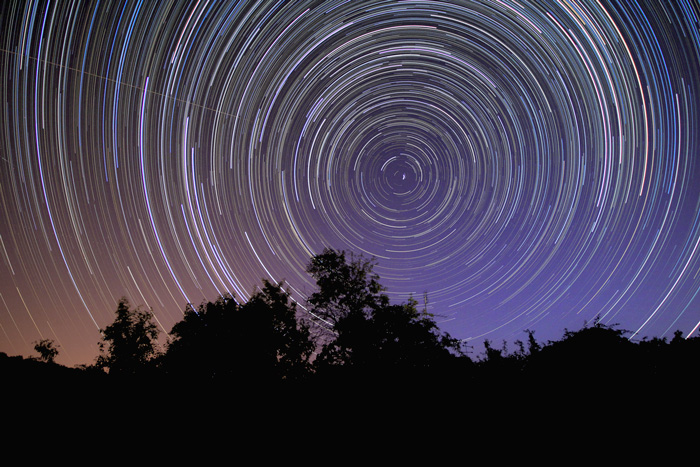 At about one o'clock in the morning of July 1, 2011, Manuel Claro pointed his camera up at the night sky above Alentejo, Portugal, and opened the shutter for 30 seconds. Then he did the same thing again and again and again, 430 exposures over the next four hours, and combined all the images to create this picture.
At about one o'clock in the morning of July 1, 2011, Manuel Claro pointed his camera up at the night sky above Alentejo, Portugal, and opened the shutter for 30 seconds. Then he did the same thing again and again and again, 430 exposures over the next four hours, and combined all the images to create this picture.
During each 30-second exposure, the earth rotated a little, while the stars pretty much stood still (by comparison). So the image of each star is smudged as the camera moves a bit; when all 430 of the smudges are shown together in a single image, we see what looks like startracks but is actually a single earthtrack, circling Polaris, the North Star.
The different colors of the different startracks reflect differences in temperature of the various stars.
night
Portugal
Alentejo
time exposure
stars
(Image credit: Miguel Claro)
Sep 2, 2013
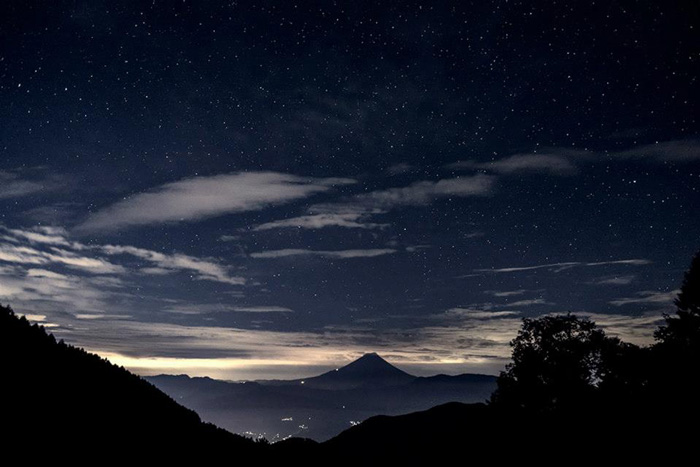 Japan's Mount Fuji, just before dawn.
Japan's Mount Fuji, just before dawn.
This is a pretty spectacular photo, with the features of an iconic landscape dwarfed by a skyful of stars and clouds and hints of daylight. Modern cameras can capture this sort of scene more or less routinely if they are set up to stare into the night, lens wide open, without blinking or moving for, in this case, twenty seconds.
The human eye could drink it in at a glance, if only we were there. But we weren't there, sadly. This morning, we must make do with the picture, and fortunately it's a picture that rewards a slowly wandering eye with pleasant little discoveries in the realms of shadow and glow, detail and hulk, pattern and emptiness.
landscape
night
Japan
dawn
sky
mountain
stars
Mount Fuji
(Image credit: Hayato Ebihara)
Jul 27, 2014
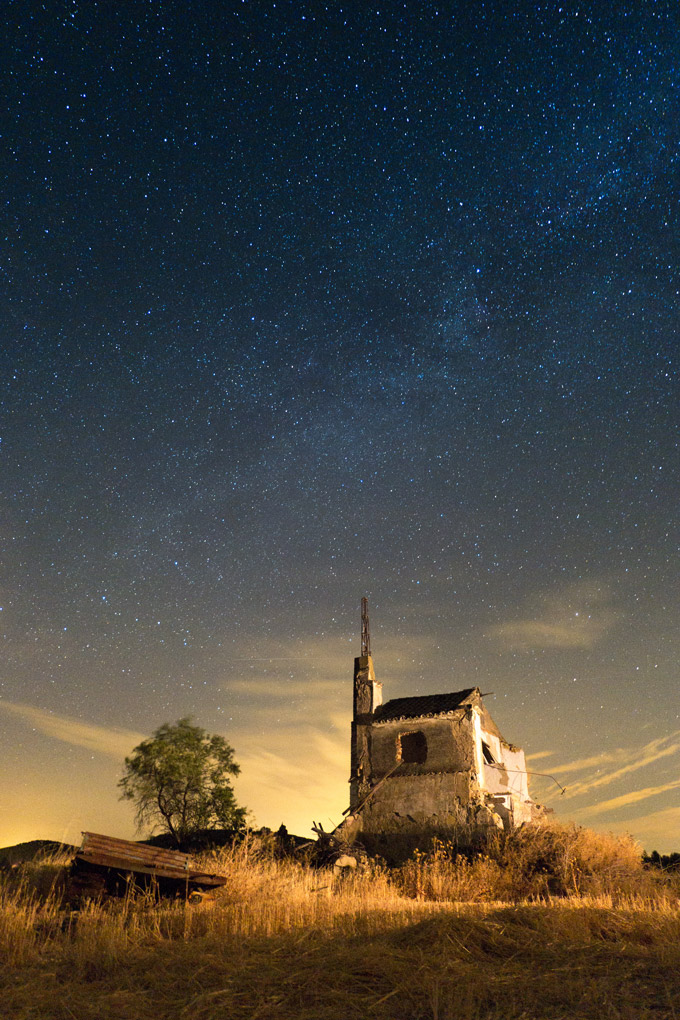
landscape
Spain
night
sunset
sky
church
stars
(Image credit: Juan Jose Ferres)
Sep 10, 2014
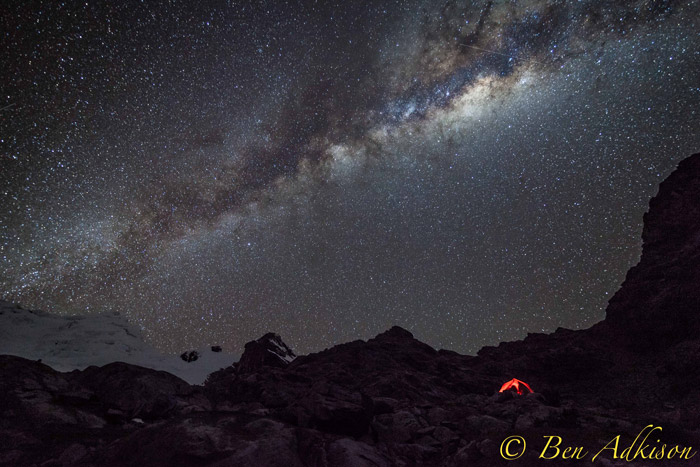 Last month, Hank joined a group of Montanans climbing in the Andes, summiting above 18,000 feet in the middle of the Peruvian winter. They were closer to the Milky Way up there.
Last month, Hank joined a group of Montanans climbing in the Andes, summiting above 18,000 feet in the middle of the Peruvian winter. They were closer to the Milky Way up there.
landscape
mountains
night
rocks
Hank
stars
night sky
Andes
Huaraz
Milky Way
Peru
(Image credit: Ben Adkison)
Feb 11, 2018
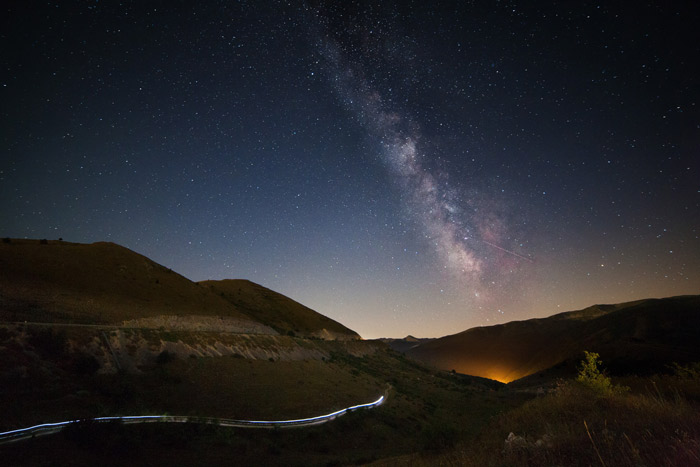 Three lights in the night create this image: firelight, starlight, and a glowing streak of human brilliance.
Three lights in the night create this image: firelight, starlight, and a glowing streak of human brilliance.
The human-powered light is the silvery streak at lower left, created by the photographer's brother, who was cycling along a mountain-bike trail in the high prairies of central Italy's Appenine Mountains. Either the cyclist wore a headlamp, or his bike was outfitted with a headlamp. The camera lens stayed open for almost half an hour–27 minutes–to preserve the track of the route.
The firelight near the lower right of the picture was from the village of Tornimparte, in the valley far below the hillsides we see here. The photo was taken in mid-August, on the night following the Feast of the Assumption, when bonfires mark the end of the summer harvest.
The starlight notably features the Milky Way, which the photographer said he'd never seen before. The reason he'd never seen it before might be visible in the part of the sky just over the horizon behind the village bonfires. The night sky looks pale back there, with fewer stars visible to the eye–perhaps because of distant light pollution emanating from the Roman metropolis about sixty miles to the northwest.
If you click on the photo and study the enlarged version–yes, life is short, but go ahead, waste a few moments fussing with a pretty picture–you may be able to see that the stars are not pinpoints of light but short little line segments, almost like tiny bits of the bicycle's light trail. In this case, however, it's not the stars so much as the earth that's moving; 27 minutes is such a long exposure time that the earth spins through almost 2% of its daily rotation, leaving little streaks of starlight as the camera and the mountains and the bicycle all move through the night.
bicycle
Italy
stars
night sky
Milky Way
firelight
Tornimparte
Feast of the Assumption
Piano di Campo Felice
Abruzzo
(Image credit: Francesco Barnes via The Image Story)
 At about one o'clock in the morning of July 1, 2011, Manuel Claro pointed his camera up at the night sky above Alentejo, Portugal, and opened the shutter for 30 seconds. Then he did the same thing again and again and again, 430 exposures over the next four hours, and combined all the images to create this picture.
At about one o'clock in the morning of July 1, 2011, Manuel Claro pointed his camera up at the night sky above Alentejo, Portugal, and opened the shutter for 30 seconds. Then he did the same thing again and again and again, 430 exposures over the next four hours, and combined all the images to create this picture.


